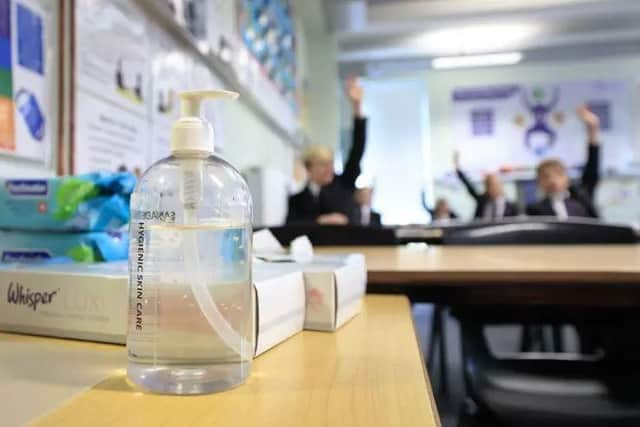Figures reveal how many pupils were excluded by Northamptonshire schools for breaching Covid rules
and live on Freeview channel 276
Breaches of coronavirus rules were behind more than 100 school exclusions in Northamptonshire last year, figures reveal.
Labour said the Government's lack of clear guidance over pandemic measures threatened children's futures, and contributed to almost 13,000 of these exclusions nationally.
Advertisement
Hide AdAdvertisement
Hide AdDepartment for Education figures show “wilful and repeated transgression of protective measures” was a reason behind 112 exclusions from schools in Northamptonshire during the 2020-21 academic year – 111 of which were temporary exclusions and one permanent.


Of these, 100 were in secondary schools and 12 in primary schools. Together the figures make up more than two percent of all exclusions.
Children across England were excluded 12,965 times for reasons including non-compliance with social distancing, causing distress such as by purposefully coughing near to others, or any other deliberate breach of a school's public health measures.
Schools were able to list multiple reasons for each exclusion for the first time last year.
Advertisement
Hide AdAdvertisement
Hide AdJulie McCulloch, director of policy at the Association of School and College Leaders, said schools worked very hard to keep pupils and staff safe during the pandemic, and it is not unreasonable that young people should be expected to comply with these measures.
However, Stephen Morgan MP, Labour’s shadow schools minister, said: “The Conservatives have created deep divides in school exclusions, with the lack of clear guidance, especially during the pandemic, threatening children’s futures and failing communities.
“The Government’s own independent review highlights the need to tackle exclusions and ensure children are supported in order to improve life chances.
“No parent wants to see their child excluded from school but once again the Conservatives have treated our children and their future opportunities as an afterthought.”
Advertisement
Hide AdAdvertisement
Hide AdIn Northamptonshire, there were a total of 4,880 exclusions — 4,813 temporary and 67 permanent — for all reasons last year, up from 4,768 in 2019-20.
Figures for the most recent academic year include a period in spring 2021 when Covid-19 restrictions meant that only key worker and vulnerable children were attending school in person, with others being educated remotely.
Of the 16 possible reasons for exclusion, public health was the tenth most frequent.
The most common reasons were for persistent disruptive behaviour (35 percent), physical assault against a pupil (18 percent) and verbal abuse or threatening behaviour towards an adult (17 percent).
Advertisement
Hide AdAdvertisement
Hide AdThe National Association of Head Teachers said schools following guidance were sometimes forced to suspend students in cases of persistent rule breaking and unsafe behaviour, with school leaders making tough decisions to keep everyone safe.
Paul Whiteman, general secretary of the union, said exclusions are always a last resort – and have fallen to an all-time low across England – but should not mean the end of the road for pupils affected.
He added: "Unfortunately cuts to health and social care services mean that the safety net for excluded young people has too many holes in it.
"This is something that the Government should address urgently.”
A Department for Education spokeswoman said permanent exclusions are a rare but necessary way of managing behaviour – but should not mean exclusion from education.
